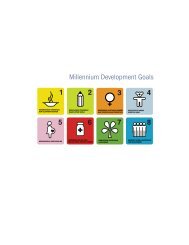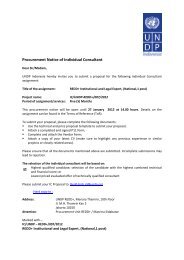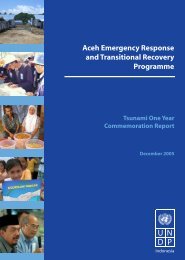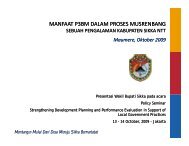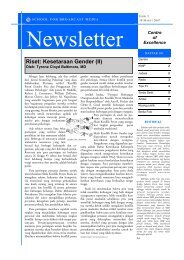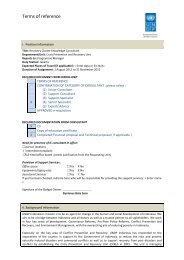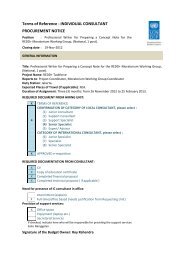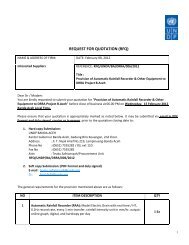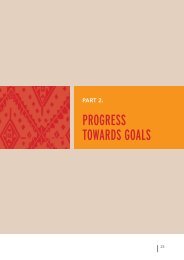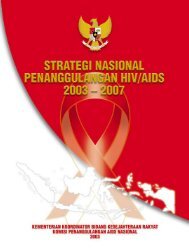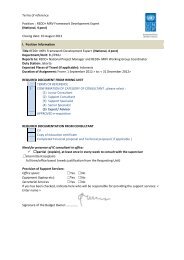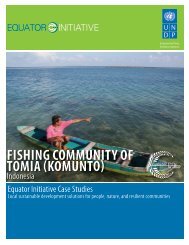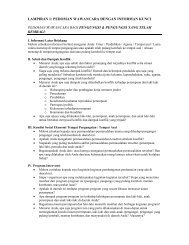Indonesia Human Development Report 2001 - UNDP
Indonesia Human Development Report 2001 - UNDP
Indonesia Human Development Report 2001 - UNDP
Create successful ePaper yourself
Turn your PDF publications into a flip-book with our unique Google optimized e-Paper software.
EXECUTIVE SUMMARY<br />
Towards a new consensus<br />
This report puts people first. It argues that<br />
progress in human development is not just<br />
essential in itself but also lays the foundations for a<br />
stable and unified democracy, and promotes the<br />
transition towards a rules-based market economy<br />
that can permit sustained economic growth. In a<br />
country as large and diverse as <strong>Indonesia</strong>, however,<br />
this can only be achieved through extensive national<br />
and regional consultations – leading to a new<br />
consensus and a shared commitment to human<br />
development.<br />
Until the onset of the financial crisis <strong>Indonesia</strong> had<br />
taken enormous strides in many aspects of human<br />
development. From 1975 to the second half of the 1990s<br />
the country's human development index (HDI) rose<br />
steadily, until the sudden dip in 1998. But the HDI tells<br />
only a part of the story. If it also reflected the extent of<br />
human rights and freedoms, the trajectory would look<br />
much less impressive, because for three decades the New<br />
Order regime had forced <strong>Indonesia</strong>ns to trade political<br />
freedom for economic progress.<br />
The purpose of this National <strong>Human</strong> <strong>Development</strong><br />
<strong>Report</strong> is to assess <strong>Indonesia</strong>'s democratic and economic<br />
transitions – to demonstrate why the country is unlikely<br />
to make enduring economic progress, or consolidate its<br />
democracy, unless it can make a firm commitment to<br />
human development. A consensus among the regions on<br />
citizens' rights to human development can also act as a<br />
centrifugal force for national unity.<br />
Achievements and challenges<br />
Over the past three decades <strong>Indonesia</strong> has had laudable<br />
achievements in human development. These range from<br />
reductions in poverty and inequality to increases in life<br />
expectancy and literacy. Infant mortality, for example,<br />
declined substantially, following improvements in access<br />
to health care and sanitation. At the same time there have<br />
been considerable improvements in the status of women:<br />
male-female gaps have been narrowing at all levels of<br />
education, and women's earnings have been increasing<br />
as a proportion of earned family income. Meanwhile<br />
disparities between the provinces have also been shrinking.<br />
The sudden and unexpected crisis of the late 1990s<br />
dealt a serious blow to <strong>Indonesia</strong>'s journey to progress.<br />
For most people the immediate and sharpest impact of<br />
the crisis has been through inflation. Between 1997 and<br />
1998 inflation surged from 6% to 78%, while real wages<br />
fell by around one-third. As a result there was a sharp<br />
increase in poverty. Between 1996 and 1999 the proportion<br />
of people living below the poverty line jumped from 18%<br />
to 24%. At the same time, poverty became more severe<br />
as the incomes of the poor as a whole fell further below<br />
the poverty line.<br />
The crisis seems to have affected women and children<br />
more adversely. For many families where both men and<br />
women were working before the crisis, women were<br />
forced to work longer hours as men lost their jobs.<br />
Declines in income also reduced families' access to health<br />
care and other basic services. There is some evidence of<br />
increased domestic violence due to economic stress<br />
following the crisis.<br />
The overall impact of the crisis was reflected in the<br />
deterioration of <strong>Indonesia</strong>'s human development index<br />
(HDI) – largely the result of the drop in real incomes.<br />
Meanwhile, although the <strong>Human</strong> Poverty Index (HPI)<br />
remained stable, there were reductions in access to health<br />
services.<br />
In the aftermath of the economic crisis, <strong>Indonesia</strong> faces<br />
serious challenges of human development. The long-term<br />
outlook for public services is poor. Because of the decision<br />
to bail out the banks the government is now deep in debt.<br />
Effectively the population as a whole has assumed a<br />
massive burden that will require them to pay higher taxes<br />
and have less effective public services.<br />
In the short-term, the tight-budgetary situation poses<br />
a threat to social spending. Any cut in social spending<br />
will have serious long-term implications, especially since<br />
<strong>Indonesia</strong> has historically lagged behind her neighbours,<br />
and a large number of people remain vulnerable to poverty.<br />
Consolidation of <strong>Indonesia</strong>'s democracy<br />
<strong>Indonesia</strong> has already experienced several forms of<br />
government, and different shades of democracy – the<br />
most recent change being the collapse of the autocratic<br />
New Order regime and the successful elections<br />
EXECUTIVE SUMMARY<br />
1



